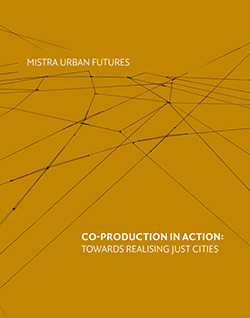Co-production in action: Towards realising just cities
Release of a new book captures the story of Mistra Urban Futures
Some years ago, in several cities on different continents, groups of people started to organise themselves differently – beyond their institutional frameworks – to create knowledge about how cities possibly could evolve in the future using co-production approaches. They began to share their insights across continents, learning from each other what particular local contexts could offer. These knowledge-transferring group of people grew into the unique international collaboration that is Mistra Urban Futures.

Realising Just Cities
If you are interested in how urban change can work towards realising a more just society in a world as challenged and challenging as ours, the book Co-production in action: Towards realizing just cities will take you one step in that direction. Its contributors share their stories of how they developed, and are constantly reworking, their methods for addressing the complexities of the urban environment. You will not be given the answers to what could be a sustainable solution to a specific urban problem, but it will take you into a discussion of how possibly to create new knowledge for difficult emerging urban challenges.
Bringing actors together
In search of this new knowledge, it is more and more frequently said that complex urban issues need a transdisciplinary approach – in other words, bringing academic and other researchers and stakeholders together in joint teams to co-produce knowledge. However, this is a challenging way of doing research. Challenging for the collaborating institutions bound by traditional formal plans and work descriptions. Challenging for research agendas that are not able to address a multi-stakeholder approach, and above all, challenging for participants who need to step out of both institutional and individual comfort zones. Or in other words eloquently put by Beth Perry, Director of the Sheffield-Manchester Platform,
“Co-production is a mindset. It’s a mature relationship. … It is similar to kids playing. Kids don’t actually play together until they’ve played along side each other for a long time. Co-production is also preceded by parallel play. Co-production isn’t a method or a process; it’s an outcome. What’s fundamentally new is the way that co-production is being used to justify certain types of relationships and practices’.”
The book has been edited by Henrietta Palmer, Deputy Scientific Director, Mistra Urban Futures and Helen Walasek, freelance editor, writer and researcher, and has over thirty contributors.
This is a book for people who are curious about transdisciplinary work on urban development. It offers insights and experiences from different local urban context – from the global North as well as from the South. It speaks about the difficulties and benefits of co-produced research within this field, and is aimed as a source of inspiration for all of you who are engaged in how to formulate a possible urban agenda towards the realisation of just cities, says Henrietta Palmer.
The book will be launched on the Realising Just Cities conference, 19-20 September in Gothenburg.
Voices from the book
“You need a top-level commitment, you need champions, but you also need the commitment from the organisations themselves. They really need to want to do this. Because it does mean to do things differently.” Mikael Cullberg, Director Gothenburg Platform
“People have grown immensely in this process, but this doesn’t mean that the city has changed – it’s not just about urban change – we have changed city officials who are more confident…” Zarina Patel, Former Director Cape Town Platform
“The establishment of the platform came at a time when Kisumu was going through a lot of dynamics, we had just experienced post-elections violence. And this brought academia together with the public sector, the private sector, civil society, as well as the informal sector, to work together.” Stephen Agong, Director Kisumu Platform
Questions? Please contact Henrietta Palmer, Deputy Scientific Director and editor of the book at Henrietta.palmer@chalmers.se or +46-76 60 55 307







